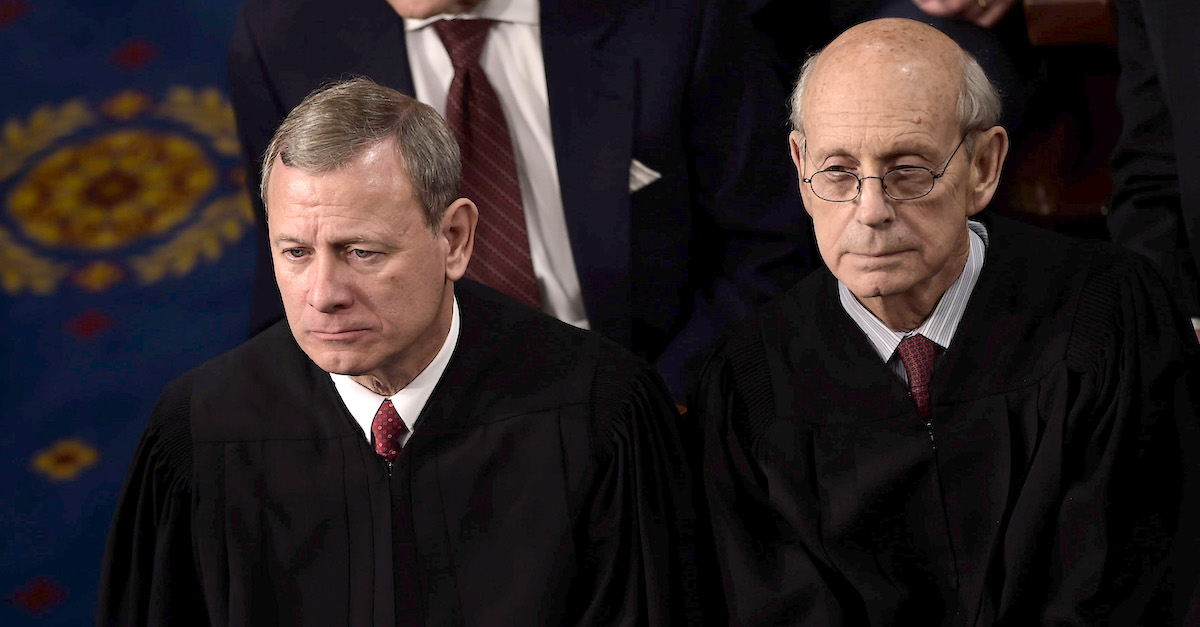
The Supreme Court zigzagged across its usual partisan boundaries in a ruling authorizing the use of eminent domain to construct a 116-mile-long natural gas pipeline snaking through Pennsylvania and New Jersey.
“This case involves one of the ways the federal eminent domain power can be exercised: through legal proceedings initiated by private delegatees against state-owned property,” Chief Justice John Roberts wrote in 23-page opinion.
“Specifically, we are asked to decide whether the federal government can constitutionally confer on pipeline companies the authority to condemn necessary rights-of-way in which a state has an interest,” the ruling continued. “We hold that it can.”
That finding brought together a surprising coalition of the court’s liberal and conservative wings: Justices Stephen Breyer, Samuel Alito, Sonia Sotomayor, and Brett Kavanaugh joined the chief justice in his majority opinion.
In 2018, the Federal Energy Regulatory Commission (FERC) issued a “certificate of public convenience and necessity” under the Natural Gas Act to PennEast Pipeline Company, conferring eminent domain powers to the private enterprise.
New Jersey challenged the decision, seeking D.C. Circuit review. PennEast separately filed federal complaints seeking to exercise its eminent domain power, winning an injunction before a U.S. district court that was reversed by the Third Circuit.
In his written opinion, Roberts detailed the lengthy history of eminent domain — going back to the 1809 construction of a turnpike road in the nation’s capital and an 1810 matter involving one of Martha Washington’s grandsons.
“When the Constitution and Bill of Rights were ratified, they did not include the words ’eminent domain,'” Roberts wrote. “The Takings Clause of the Fifth Amendment (‘nor shall private property be taken for public use, without just compensation’) nevertheless recognized the existence of such a power. Shortly after the founding, the Federal Government began exercising its eminent domain authority in areas subject to exclusive federal jurisdiction.”
Roberts said that power was deployed to public and private interests alike.
“For as long as the eminent domain power has been exercised by the United States, it has also been delegated to private parties,” the majority opinion states. “It was commonplace before and after the founding for the Colonies and then the States to authorize the private condemnation of land for a variety of public works.”
Anthony Cox, the chair of the PennEast Board of Managers, praised the majority’s ruling.
“This decision is about more than just the PennEast Pipeline Project; it protects consumers who rely on infrastructure projects—found to be in the public benefit after thorough scientific and environmental reviews—from being denied access to much-needed energy by narrow State political interests,” Cox wrote in a statement. “PennEast understood that New Jersey brought this case for political purposes, but energy crises in recent years in California, Texas, and New England, have clearly demonstrated why interstate natural gas infrastructure is so vital for our way of life, public safety and enabling clean energy goals.”
New Jersey’s counsel did not immediately respond to an email requesting comment, but a senior counsel for the Institute for Justice—which backed the Garden State’s position—found that the ruling rejected a U.S. government position by allowing property owners to assert a “defense against the condemnation proceedings initiated” by private pipeline companies wielding the federal government’s power of eminent domain.
“The federal government’s arguments in this case were sweeping, dangerous, and wrong, and the federal government’s loss is a win for property rights everywhere,” Institute for Justice counsel Bob McNamara wrote in a statement.
In a dissenting opinion, Justice Amy Coney Barrett said that this history does not settle the argument.
“The Court relies exclusively on the fact that Congress and the States, like the Colonies before them, have consistently authorized private parties to exercise the right of eminent domain to obtain property for mills, roads, and other public improvements,” Barrett wrote. “As the Court notes, Congress did so in the early days of the Republic only within ‘areas subject to exclusive federal jurisdiction,’ though we later held that Congress could take property within state boundaries as well. [ . . . ] This history is long and undisputed, and the Court presents it as conclusive evidence on PennEast’s side of the ledger.”
“But the question before us is not whether Congress can authorize a private party to exercise the right of eminent domain against another private party, which is the proposition this history supports,” the dissent continues. “Nor is it whether Congress can authorize a private entity to take state property through means other than a condemnation suit. The question is whether Congress can authorize a private party to bring a condemnation suit against a State. And on that score, the Court comes up dry.”
Justices Clarence Thomas, Elena Kagan and Neil Gorsuch joined Barrett’s dissent.
“I join Justice Barrett’s dissenting opinion in full, which ably explains why this case implicates New Jersey’s structural immunity and how New Jersey never waived that immunity in the summer months of 1787,” Gorsuch wrote in a separate dissent, which adds his belief that the Garden State also enjoyed immunity from PennEast’s suit under the Eleventh Amendment.
Read the ruling below:
Have a tip we should know? [email protected]